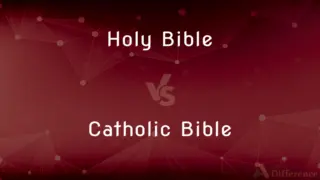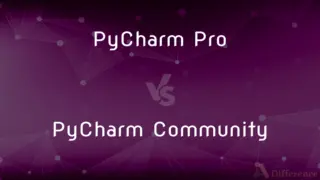Fairy Tale vs. Folktale — What's the Difference?
Edited by Tayyaba Rehman — By Fiza Rafique — Published on December 21, 2023
Fairy Tale tells the Story with magic, often with fairies. Folktale is a traditional story passed down, reflecting cultural beliefs.

Difference Between Fairy Tale and Folktale
Table of Contents
ADVERTISEMENT
Key Differences
A Fairy Tale is a type of story that typically features fantastical elements, such as magic, mythical creatures, and often, fairies. These tales, while sometimes rooted in older stories, can be recent inventions and often have elements of moral lessons or virtues. Conversely, a Folktale is a story that has been passed down orally through generations and tends to reflect the beliefs, customs, and traditions of a specific culture or group.
Diving deeper into Fairy Tales, one finds that they often exist in a magical realm, separate from our own. They may involve quests, magical assistance, and challenges to be overcome. Folktale, while it can contain magic, primarily serves as a mirror to the society it originates from, reflecting its values, fears, and hopes. Both genres offer valuable insights, but while Fairy Tales often entertain and instruct, Folktales tend to preserve cultural identity.
Considering the characters, Fairy Tales typically feature royalty, heroes, and mythical beings like dragons, witches, or, as the name suggests, fairies. In contrast, characters in a Folktale can be everyday people, animals, or even inanimate objects brought to life. While Fairy Tales may lean towards enchanting escapism, Folktales often ground themselves in the community's realities, albeit with a touch of the fantastical.
In terms of origin, Fairy Tales might not be traceable to a specific source or culture. They could be the creative invention of an individual, later adopted by masses. Folktales, on the other hand, deeply root themselves in a community's shared history. When one hears a Fairy Tale, they venture into a world of enchantment; with a Folktale, they glimpse into a community's heart and soul.
Lastly, while both Fairy Tales and Folktales can serve to educate, entertain, or caution, their methods differ. Fairy Tales often have a clear moral or lesson, wrapped in layers of magic and fantasy. Folktales might be more varied, sometimes serving as cautionary tales, sometimes as humor, and sometimes simply as a means of explaining natural phenomena. Both hold immense cultural value, with Fairy Tales emphasizing wonder and Folktales emphasizing tradition.
ADVERTISEMENT
Comparison Chart
Elements
Magic, mythical creatures, often fairies.
Traditions, cultural beliefs, sometimes magic.
Origins
Can be recent inventions or old; not culture-specific.
Passed down orally; deeply rooted in specific cultures.
Characters
Royalty, heroes, mythical beings.
Everyday people, animals, objects; cultural figures.
Purpose
Entertain, instruct with moral lessons.
Preserve culture, entertain, explain phenomena.
Setting
Often in a magical, fantastical realm.
Reflects the community's realities; can be fantastical.
Compare with Definitions
Fairy Tale
A magical story often involving fairies.
Cinderella is a classic Fairy Tale about a girl, a slipper, and a prince.
Folktale
A traditional story passed down orally.
The story of John Henry is an American Folktale.
Fairy Tale
A narrative with fantastical elements and characters.
The Fairy Tale of Rapunzel features a girl with incredibly long hair.
Folktale
A story rooted in a specific group's shared history.
The Folktale of Brer Rabbit has roots in African and Cherokee traditions.
Fairy Tale
Fiction with magic, royalty, and mythical creatures.
Sleeping Beauty is a Fairy Tale where a princess is cursed to sleep.
Folktale
Tales preserving and conveying cultural values.
The Folktale of Anansi the Spider teaches about wit overcoming strength.
Fairy Tale
A tale of enchantment often teaching a lesson.
The Fairy Tale The Frog Prince teaches about looking beyond appearances.
Folktale
A narrative reflecting cultural beliefs and customs.
The Folktale of Paul Bunyan reflects frontier life and logging culture.
Fairy Tale
A story set in a realm of wonder and magic.
Snow White is a Fairy Tale with a magic mirror and seven dwarfs.
Folktale
Community-based tales often explaining phenomena.
A popular Folktale explains why the owl is nocturnal.
Fairy Tale
Of or relating to a fairy tale.
Folktale
A story or legend forming part of an oral tradition.
Fairy Tale
Likened to a fairy tale
A fairy-tale romance that preceded the royal wedding.
Folktale
A tale or story that is part of the oral tradition of a people or a place.
Fairy Tale
Of the nature of a fairy tale; as if from a fairy tale.
A fairy-tale romance
Folktale
A tale circulated by word of mouth among the common folk, especially one forming part of the tradition of a culture.
Folktale
A tale circulated by word of mouth among the common folk
Common Curiosities
Are all Fairy Tales old stories?
No, while many Fairy Tales are ancient, new ones can be created anytime.
Do Fairy Tales always have fairies?
No, Fairy Tales can involve magic and mythical creatures without necessarily including fairies.
Can a story be both a Fairy Tale and a Folktale?
While they have distinct characteristics, some stories can have elements of both.
Is a Folktale specific to a certain culture?
Yes, Folktales often originate and are deeply rooted in specific cultures or communities.
Are Folktales always orally passed down?
Historically, yes. But many have been written down and published over time.
Why are Fairy Tales popular with children?
Fairy Tales often involve enchantment, clear morals, and relatable themes, appealing to children.
Do Fairy Tales always have a happy ending?
While many do, not all Fairy Tales end happily.
Are Folktales always true stories?
No, Folktales can be fictional but reflect cultural truths or beliefs.
Who typically tells Folktales?
Elders or storytellers traditionally share Folktales within communities.
Are Folktales only about humans?
No, Folktales can involve animals, inanimate objects, or nature, often anthropomorphized.
What's the main aim of a Folktale?
Folktales primarily preserve and convey cultural values, beliefs, and traditions.
Can Fairy Tales be dark or scary?
Yes, some Fairy Tales have darker themes or cautionary elements.
Can a Folktale be humorous?
Yes, some Folktales are light-hearted and meant to amuse.
Are Fairy Tales only found in books?
No, Fairy Tales can be found in oral traditions, films, music, and other media.
Are Fairy Tales only for entertainment?
While entertaining, many Fairy Tales also instruct or convey morals.
Share Your Discovery

Previous Comparison
Holy Bible vs. Catholic Bible
Next Comparison
Absorption Spectra vs. Emission SpectraAuthor Spotlight
Written by
Fiza RafiqueFiza Rafique is a skilled content writer at AskDifference.com, where she meticulously refines and enhances written pieces. Drawing from her vast editorial expertise, Fiza ensures clarity, accuracy, and precision in every article. Passionate about language, she continually seeks to elevate the quality of content for readers worldwide.
Edited by
Tayyaba RehmanTayyaba Rehman is a distinguished writer, currently serving as a primary contributor to askdifference.com. As a researcher in semantics and etymology, Tayyaba's passion for the complexity of languages and their distinctions has found a perfect home on the platform. Tayyaba delves into the intricacies of language, distinguishing between commonly confused words and phrases, thereby providing clarity for readers worldwide.













































